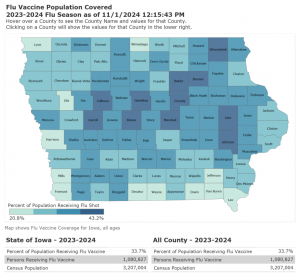IDPH report: Deaths by suicide decrease in Iowa, syphilis cases continue to rise
November 7th, 2024 by Ric Hanson
(Des Moines, Iowa) – The number of deaths by suicide in Iowa decreased in 2023 for the first time, significantly, in almost 10 years, according to updated data from the Iowa Department of Health and Human Services, which also showed an increase in teen suicide rates. The data, as part of the Iowa Public Health Tracking Portal, also showed immunization rates, statistics around births and deaths in the state, rates of sexually transmitted infections and the top baby names for 2023. The Iowa Capital Dispatch says the portal is a centralized hub for public health data throughout the state. The majority of statistics monitored are Nationally Consistent Data Measures, which are set by the Centers for Disease Control and Prevention and make it possible to compare data from state to state. The data visualizations are regularly updated with new figures as the department processes the information.
Below are some of the updates to the portal from fall 2024:
Immunization records
The percentage of the population who received a flu vaccination has declined since 2020 for Iowans under 65. However, 64% of Iowans over the age of 65 received a flu vaccine in the 2023-2024 flu season, up significantly from the 2021-2022 year when just 41% of that age group received a flu shot.

The Iowa Public Health Tracking Portal has updated data visualizations on flu immunization rates in the state and by county. (Graphic courtesy of Iowa Department of Health and Human Services)
Nearly 34% of all Iowans, regardless of age, received a flu vaccine in the 2023-2024 flu season. Less than 16% of Iowans received a COVID-19 vaccine in the 2023-2024 flu season, with the majority of immunized Iowans residing in urban areas like Polk or Johnson counties.
Vital records
Maternal and paternal ages have increased steadily since 2006, with the average age for Iowa mothers, or parent A, at 29, and fathers, or parent B, at 31 in 2023. Nearly 100 more males than females were born in Iowa in 2023. Live birth and death rates have remained stable over the past 20 years in Iowa.
The percent of premature births remained the same from 2022 to 2023, but has increased 1.6% since 2000. And overall, there were 36,505 babies born in Iowa in 2023, about 1,000 fewer babies than were born in 2019, according to the department.
Heart disease was the number one cause of death in Iowa, followed by cancer in 2023. Cancer as a cause of death has decreased slightly from 2013, while the rate of death from diseases of the heart has stayed around the same, at about 18 per 10,000 people.
Other leading causes of death for 2023, and over the past 20 years, include cerebrovascular diseases (including stroke), chronic lower respiratory diseases and unintentional injuries, including transportation accidents and natural disasters. The 2023 data also show men were reported dying from most of these causes at higher rates than women.
Death by suicide went down in Iowa in 2023, to fewer than 500, for the first time since 2018. The number peaked in 2022, with nearly 600 reported deaths by suicide in Iowa. The teenage suicide rate for the state, however, increased from 3.1% in 2022 to 5.2% in 2023. County specific data is also available on the state data portal, which shows teens die by suicide at higher rates in Polk County than the state as a whole.
Sexually transmitted infections: The fall data update also included 2023 cases of gonorrhea, chlamydia and syphilis in the state. Chlamydia is the most common out of the three, though cases declined from 2022 by about 1,000. Gonorrhea cases have similarly declined, but cases of syphilis in the state have drastically increased from fewer than 300 cases in 2018 to nearly 950 cases in 2023.
This is not unique to Iowa, however, syphilis cases have been on the rise nationally, and according to NPR is linked to increased substance abuse, decreased condom use and a lack of testing, or access to testing, for sexually transmitted diseases.





